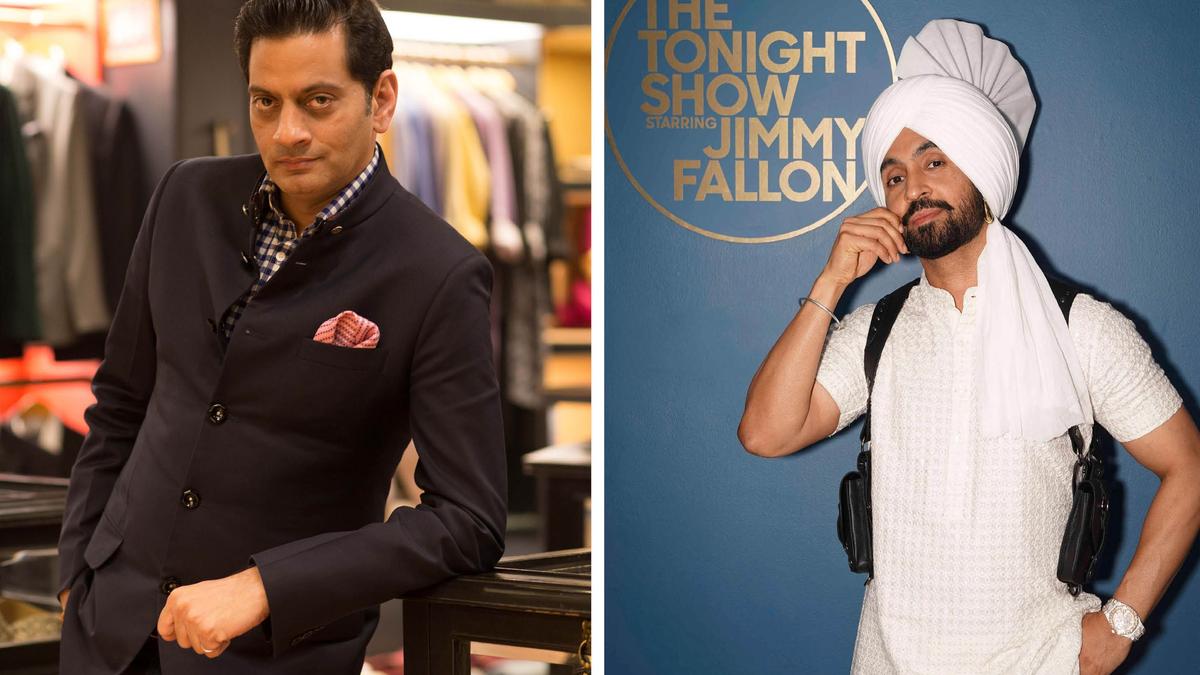
Decoding Diljit Dosanjh’s global desi style with designer Raghavendra Rathore
The Hindu
The Audemars Piguet watch — customised with diamond-studded dial, straps and bezel by Jain The Jeweler — and a pair of high-ankle Air Jordan were as conspicuous as the turlay wali pagg (or a pleated-fan turban) and kurta-chaadra (the Punjabi version of a dhoti or lungi) designed by ace couturier Raghavendra Rathore. The ivory, sequined traditional folk dress was one of the 18 pairs that had been tailored for Diljit’s Dil-luminati North America tour.
When Punjabi musician-actor Diljit Dosanjh made his debut on The Tonight Show Starring Jimmy Fallon, he engineered a look rooted in tradition, but one which was garnished with a luxurious blend of ultra-chic brands that spoke to a global audience.
The Audemars Piguet watch — customised with diamond-studded dial, straps and bezel by Jain The Jeweler — and a pair of high-ankle Air Jordan were as conspicuous as the turlay wali pagg (or a pleated-fan turban) and kurta-chaadra (the Punjabi version of a dhoti or lungi) designed by ace couturier Raghavendra Rathore. The ivory, sequined traditional folk dress was one of 18 pairs that had been tailored for Diljit’s Dil-luminati North America tour.
“Our teams connected over a long-distance Zoom call in March this year, so we had nearly a month to execute the project as Diljit’s tour began in April,” shares Rathore while underlining the precarious play of proportions, colours and textures, which are crucial but often susceptible to error during virtual dealings. “But we managed to get the proportions, colours, and textures in one easy lot of sketches we did with swatches and fabrics. It was a priority project, and we had to ensure that shipping the clothes etc. was done on time,” he adds.
Of course, there was a mandate that determined the edit: Everything had to go with the turlay wali pagg, Diljit shared with the designer. “I was so impressed to see how humble he is, and he had the values that excite a brand like ours. He emphasised on the idea of the clothes being simple, stylish, but at the same time, rooted in heritage,” says Rathore. He adds that Diljit wanted the clothes to have shimmer and were designed keeping in mind the cities he would perform in.
The kurta and tehmat, tamba or chaadra is the quintessential folk dress often sported by men in Punjab’s hinterland and has been worn by doyens of Punjabi music — from Lal Chand Yamla Jatt and Kuldeep Manak to Gurdaas Maan and Surjit Bindrakhia — which lends a certain recall value to the attire. It forms the base of Diljit’s on-stage style grammar. However, he also embraces the western arch of the NRIs who defined fashion in Punjabi music during the late ‘90s and early Noughties, with musicians like Sukhbir, Jazzy B, Dr. Zeus and Bally Sagoo. Needless to say, the embroidered vest that completes the kurta-chaadra finds new expression in Diljit’s fashion vocabulary; it has been replaced with a harness (sported by actors like Timothée Chalamet, Michael B Jordan and the late Chadwick Boseman). The Punjabi jutti too has been substituted with modern-day sneakers, which actually became the reference point for Rathore to decipher the colours for Diljit’s outfits.
“Our focus was on looking at the colours of the shoes he likes and also when you take a kurta, which is traditionally worn with full sleeves, to a very short length, you tighten up that area and the whole look becomes super contemporary,” he adds. One of the biggest challenges for the designer was to create an embroidered kurta that could weather three-four hours of performance, which includes dancing, and was comfortable and itch-free. “When you embroider something on a thin kurta fabric, you have to be careful because you are leaving a possibility of irritation inside the kurta — the thread goes in and then comes back on the face of the outfit. We did a coat of embroidery which was a lighter texture and then the sequins and shimmer was added on that layer. So it was not so pokey on the inside. That was an important part,” explains Rathore.
Fabrics such as cotton blends, silks, and satins were used for creating the bespoke looks for Diljit, he shares. “Embroideries were carefully thought through, taking inspiration from kantha, phulkari, zardozi and many other traditional techniques to create contemporary motifs and patterns that appeal to a global stage. Handcrafted textures provided unique fabric bases for a timeless look and feel of the overall outfits. We do cotton blends and textures and embroidery and some were just tailored,” he says.











